Contemporary Korean Political Thought and Park Chung-hee
East Asian Comparative Ethics,
Politics and Philosophy of Law
Series Editors : Philip J. Ivanhoe, Chair Professor of East Asia Comparative Philosophy and Religion and Director of the Center for East Asian and Comparative Philosophy (CEACOP) at City University of Hong Kong; Sungmoon Kim, Associate Professor of Political Theory at City University of Hong Kong; Eirik Lang Harris, Assistant Professor of Philosophy at City University of Hong Kong
East Asian Comparative Ethics, Politics and Philosophy of Law series features path-breaking and field-defining works in East Asian comparative philosophy with a special interest in works of normative and applied ethics, political theory and philosophy of law.
Confucianism, Law, and Democracy in Contemporary Korea , edited by Sungmoon Kim
Traditional Korean Philosophy: Problems and Debates edited by Youngsun Back and Philip J. Ivanhoe.
Contemporary Korean Political Thought and Park Chung-hee by Jung In Kang
Published by Rowman & Littlefield International Ltd Unit A, Whitacre Mews, 26-34 Stannary Street, London SE11 4AB www.rowmaninternational.com
Rowman & Littlefield International Ltd.is an affiliate of Rowman & Littlefield 4501 Forbes Boulevard, Suite 200, Lanham, Maryland 20706, USA With additional offices in Boulder, New York, Toronto (Canada), and Plymouth (UK) www.rowman.com
Copyright 2017 by Jung In Kang
All rights reserved . No part of this book may be reproduced in any form or by any electronic or mechanical means, including information storage and retrieval systems, without written permission from the publisher, except by a reviewer who may quote passages in a review.
British Library Cataloguing in Publication Data
A catalogue record for this book is available from the British Library
ISBN: HB 978-1-7834-8627-4
PB 978-1-7834-8628-1
Library of Congress Cataloging-in-Publication Data Available
ISBN: 978-1-78660-248-0 (cloth : alk. paper)
ISBN: 978-1-78660-250-3 (electronic)
 The paper used in this publication meets the minimum requirements of American National Standard for Information SciencesPermanence of Paper for Printed Library Materials, ANSI/NISO Z39.48-1992.
The paper used in this publication meets the minimum requirements of American National Standard for Information SciencesPermanence of Paper for Printed Library Materials, ANSI/NISO Z39.48-1992.
Printed in the United States of America
Contemporary Korean Political Thought and Park Chung-hee
Jung In Kang

This book is dedicated to my family
Contents
Authors Note
Preface
Acknowledgements
Introduction
PART 1: TRENDS AND CHARACTERISTICS OF CONTEMPORARY KOREAN POLITICAL THOUGHT
1The Dynamic Evolution of Contemporary Korean Political Thought: An Overview
2The Dialectic of Nonsimultaneity
3The Sanctification of Nationalism
PART 2: THE POLITICAL THOUGHT OF PARK CHUNG-HEE
4Discourses on Democracy
5Antiliberal Conservatism for Modernization
6Discourses on Nationalism
PART 3: CONTEMPORARY KOREAN POLITICAL THOUGHT SINCE DEMOCRATIZATION
7Conclusion: Trends in Korean Political Ideology since Democratization
References
About the Author
Index
Authors Note
In the main text and endnotes of this book all Korean, Chinese, and Japanese names appear in the text with the family name preceding the given name (the references follow the English-language practice of given name first). Also, the conventional transliterations for Korean, Chinese, and Japanese are used.
The source for the speeches and statements of Park Chung-hee that are quoted or otherwise cited herein is Park Chung-hee Daetongnyeongyeonseolmunjip [The Collected Speeches of President Park Chung-hee], published by Daetongnyeongbiseosil. It consists of six volumes and one jip a bookletcovering the period from 1961 to 1979. When I quote or refer to one of Parks speeches or statements, its title and date are given, with the numbers of the volume (or jip ) and pages added at the end for convenience: for example, Air Force Academy Graduation Ceremony Address, February 22, 1963, 1:378.
Throughout the text, unless otherwise noted, translations into English of Korean texts are by me.
Preface
In order to understand the democratization of Korean politics and the Koreanization of democracy over the last seven decades since the establishment of South Korea in 1948, it is necessary to examine the ideological terrain of contemporary Korean politics, the characteristics of which have taken shape in the ongoing process of Koreas accommodation of four major ideologies of Western origin: liberalism (or liberal democracy), conservatism, nationalism, and socialism (or radicalism). These four ideologies have shaped democratization, competing with one another for political mastery and legitimacy, while they were in turn molded interactively to adapt themselves to democracy. I believe that such a task should be carried out with keen awareness and thorough clarification of the peripheral and belated nature of the Korean polity in modern world history. In other words, it requires macroscopic yet careful insight into the structural conditions that give Koreas contemporary ideological topography its own distinctive features in the context of world history shaped and dominated by Western civilization.
Focusing on these four ideologies, this book analyzes the ideological landscape of contemporary Korean politics while comparing it with that of European early comers such as England and France. This task is carried out by elucidating these ideologies in light of two concepts, the simultaneity of the non-simultaneous and the sanctification of nationalism. These concepts are derived from my own reflection upon the characteristic experience that peripheral latecomer countries such as Korea had to undergo in accommodating political ideas and ideologies from the early-comer countries in the West. Nonsimultaneity is a structural property brewed from the clash between world historical time (a product of Western-centrism) and Korean national historical time and the resulting suppression, repulsion, mutation, and convergence, whereas sanctification can be seen as a substantive quality of the same terrain, formed by a combination of the defining influence of nonsimultaneity and Koreas own particular historical experiences since the late nineteenth century. The basic premise of this book, however, is that such differences from Western experience are not mere deviations from the normal or exceptions or derivatives; they must be interpreted as the outcome of the particular historical and political conditions in Korean society. Thus the two concepts work as a medium of interpretation for Western political theory.
After articulating these two most preeminent characteristics, I reconstruct and analyze the political ideology contained in the political discourses of President Park Chung-hee, the most revered, albeit the most controversial, president in the history of South Korea. The task assesses how nonsimultaneity and sanctification are interwoven with Parks thought, while reconstructing the political thought of former President Park in terms of four modern ideologies. I conclude by tracing the changes undergone by nonsimultaneity and sanctification in the three decades since democratization, with some speculation on their future, and by examining the ideological legacy and ramifications of Park Chung-hees authoritarian politics in the twenty-first century.
In early December 2016, when the manuscript for this book was being finalized, the National Assembly of the Republic of Korea passed a resolution to impeach President Park Geun-hye by an overwhelming vote. There are many reasons for such an unusual political development: rampant widespread corruption and irregularities stemming from power abuse, chronic economic stagnation, diplomatic failures, and inveterate collusive links between business and politics. In addition, one of the immediate causes for triggering impeachment was that Choi Soon-sil, an old and close friend of the presidents, wielded and abused enormous power without holding any official title, by usurping presidential power. Moreover, Park Geun-hye also appointed Kim Ki-chun, who had held a key position in the Korean Central Intelligence Agency during Park Chung-hees notorious iron rule (Yusin regime), committing himself fully to sinister political maneuvers including red-baiting, as the current presidents chief presidential secretary. Pulling strings behind the scenes, he launched public-security politics on a full scale, scrupulously placing under surveillance and suppressing any opinions and activities critical of the Park Geun-hye administration. This situation infuriated the general populace, driving millions of people to the streets where they staged nationwide candlelight demonstrations every weekend for a few months.


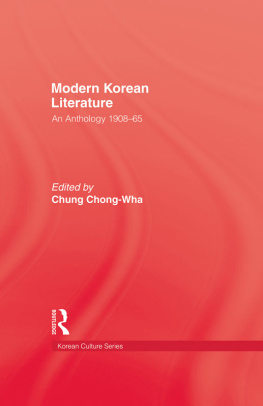
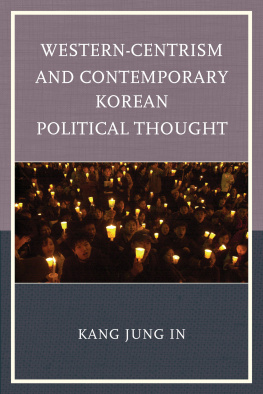
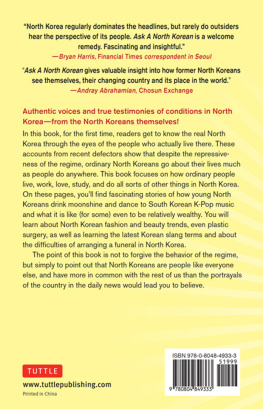
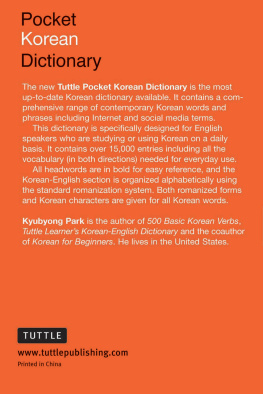

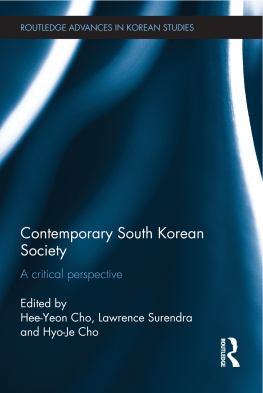
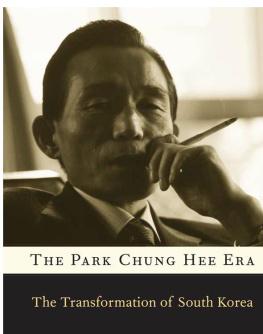
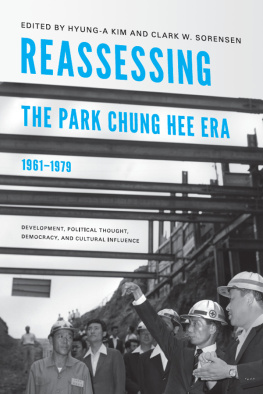
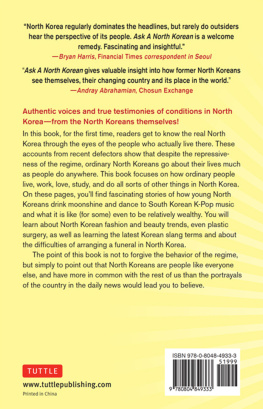


 The paper used in this publication meets the minimum requirements of American National Standard for Information SciencesPermanence of Paper for Printed Library Materials, ANSI/NISO Z39.48-1992.
The paper used in this publication meets the minimum requirements of American National Standard for Information SciencesPermanence of Paper for Printed Library Materials, ANSI/NISO Z39.48-1992.